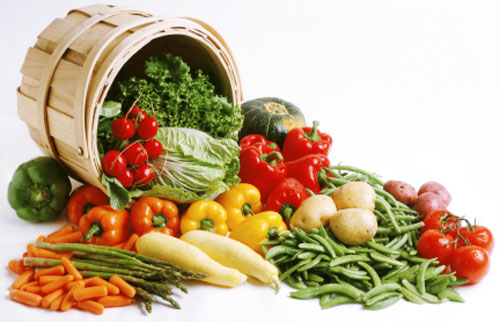
Written By: Sejal Dave, RD
Title: Registered Dietitian
Alumni: University of Florida
Last Updated on:

We all know that vegetables are good for our health, but we don’t always eat enough veggies each day. Here are some suggestions on how to boost your daily vegetable intake.

Try making the following dishes with veggies:
1 cup of shredded zucchini can be added to any cupcake recipe.
Add 1 cup of pureed broccoli to your favorite brownie recipe.
There are many easy and fun ways to increase your vegetable intake. To make it second nature, keep fresh vegetables chopped up and shredded in separate containers in your refrigerator. They’ll be ready to add to any meal or snack – just pick an idea from above.
When fresh vegetables are not readily available, frozen is also a good option. Fruits and vegetables are the nutritional powerhouses of your diet. They are brimming with vitamins, minerals, fiber and phytochemicals that may protect against cancer, heart disease, stroke and other health problems. As grocery stores and markets are flooded with the best of the fall harvest, it’s important to remember, the more fruits and vegetables you eat, the more you turn on their power! But what if there are slim pickings in the produce aisle? Should you head to the freezer case to pick up bags of frozen fruits and vegetables? You betcha!
In 1998, the Food & Drug Administration (FDA) confirmed that frozen fruits and vegetables provide the same essential nutrients and health benefits as fresh. It’s no wonder. Frozen fruits and vegetables are nothing more than fresh fruits and vegetables that have been blanched (cooked for a short time in boiling water or steamed) and frozen within hours of being picked. Further, frozen fruits and vegetables are processed at their peak in terms of freshness and nutrition.What’s not to like?
The idea is to focus on getting MORE fruits and vegetables in your diet. Fresh, frozen, diced, sliced, steamed, raw, whatever. You just want more. In fact, starting in March of 2007, the CDC and the Produce for Better Health Foundation are launching a national campaign with the slogan, “Fruits & Veggies — More Matters.”
The new message replaces the old “Five a Day” campaign, which dates back to the early 1990s. Why? Because five servings of fruits and vegetables is just not enough. Adults need anywhere from seven to 13 cups of produce daily to reap all the health benefits of fruits and vegetables. So, more really does matter.
Any fruits and vegetables are better than no fruits and vegetables. For peak flavor and good value, fresh produce in season is always a good choice. But frozen or canned fruits and vegetables, without added salt or sugar, are just as good for you as fresh. Here some easy ways to sneak more fresh and frozen fruits and veggies into your diet.
Alumni: University of Florida – Sejal is a registered dietitian, a certified diabetes educator and she holds a masters degree in nutrition and health. Sejal was the project coordinator for the Veteran’s Administrations (VA) national weight loss program and previously worked for the VA hospital in Tampa, FL as a Spinal Cord Injury dietitian.
Sejal has had numerous clinical and community education experiences, including pediatric and intensive care nutrition support. She has also had the opportunity to teach nutrition courses at the community college level to students interested in pursuing health professions. One of her favorite areas of education is diabetes management.
healthy meals, healthy snacks, vegetables
How to Choose the Right Granola Bar for You
Ditch Bottled Sweet and Sour Sauce and Create Your Own – Podcast